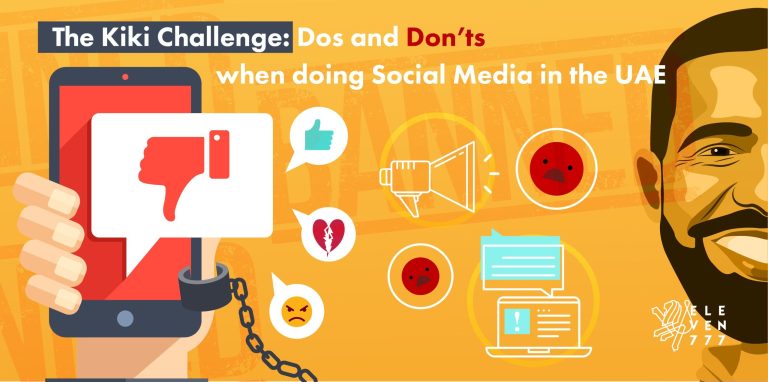Social media challenges have ranged from the fun to the near-fatal. The Kiki challenge was probably both. And here lies the Kiki challenge for UAE content producers: How do you put out trendy content while staying within the confines of the law?
Social media challenges have ranged from the charitable and fun – the ALS Ice Bucket challenge – to the potentially fatal – think Tide Pod challenge. The “Kiki Challenge”, also known as “the Shiggy Shake” was probably all those things.
The viral internet challenge originated on the Instagram account of comedian Lil Shuzi, and is performed alongside Canadian rapper Drake’s song, “In My Feelings (Keke/Kiki)”. The challenge involves jumping out of a moving vehicle and dancing along to the catchy tune. No shock then that the dance challenge has had its fair share of “fails” or accidents.
As a result, countries like Egypt and Spain, issued warnings to its citizens about the catastrophic consequences that could result from participating in this viral sensation.
The UAE did one better and announced it would issue an AED 2,000 fine, and 23 black points on the license of the offending driver. Cars would also be seized for 60 days, were the challenge to be performed on the streets. Stamping out the Shiggy Shake is just one of the ways the UAE has prevented public harm in the realm of social media.
But here lies the Kiki challenge: How can your brand put out content that is fun, entertaining and trendy while not veering towards the wrong side of the law?
The answer: Do fun and trendy. But then run that content via a vetting system to see if any of these five basic social media rules would be offended:
1. Don’t tag people in pictures or post their pictures without their consent
Regardless of whether the picture being posted is that of a close friend or someone you photographed in public, you’ll need their consent before tagging them. Otherwise, you risk a fine of AED 150,000 and a six-month imprisonment term. The first rule, then, is don’t be too quick to pull the camera trigger or hit the tag button.
2. Respect people’s privacy
Posting information about an individual that is considered ‘private’, without their consent, is also considered a violation in the UAE. Disclosing confidential information about an individual or a company could lead to a heavy fine and temporary imprisonment. So, the next time you get mad at someone, think twice before divulging their personal information on the internet.
3. Avoid spreading rumours and gossiping on the internet
So apparently Drake and Rihanna are no longer friends because “Drake is a stage five clinger”. See, gossip can be fun. But when gossip veers into the realm of spreading false information, or defamation, you could face a fine of up to a million dirhams.
4. Don’t post content that insults the local religion and traditions
Offending Islamic morals and traditions by publishing content that slanders the religion, depicts the usage of alcohol and tobacco or contains nudity is a serious offence in the UAE. This is, and ought to be, both common knowledge, and common sense.
5. Don’t be a bully
The internet is meant to be a place to voice opinions and to share your latest cat videos; it is not a place to harass people for their views. Users posting content that includes hate speech and threats or incites to violence – you’ve been warned!
Your social media can be, and ought to be, fun. But it should also be legal. If you’re an individual or a brand in the UAE, we recommend that you keep up with the trends and keep your content current. But then run them by these 5 social media don’ts to know if you should make them public or not.
Creating content in the UAE that abides by all these rules may seem like a bit of a challenge. As it may be challenging to stick to these 5 best practices when marketing in the Middle East. But hey, since when did social media shy from a healthy challenge?
